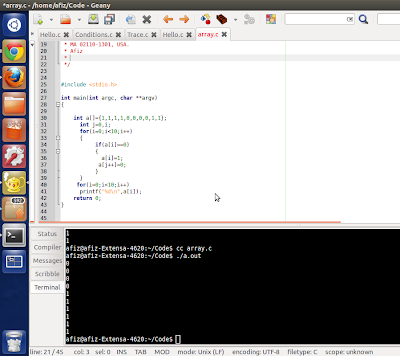#include <stdio.h>
#include <string.h>
char str[100], sub[100];
int count = 0, count1 = 0;
int position[100];
void main()
{
int i, j, l, l1, l2;
printf("\nEnter a string : ");
scanf("%[^\n]s", str);
l1 = strlen(str);
printf("\nEnter a substring : ");
scanf(" %[^\n]s", sub);
l2 = strlen(sub);
for (i = 0; i < l1;)
{
j = 0;
int temp = i;
count = 0;
while ((str[i] == sub[j]))
{
count++;
i++;
j++;
}
if (count == l2)
{
position[count1] = temp;
count1++;
count = 0;
i = temp + 1;
}
else
i = temp + 1;
}
printf("%s occurs %d times in %s", sub, count1, str);
int x;
for(x=0;x< 100;x++)
{
if(position[x]==0){
break;}
printf("\n %d \t", position[x]);
}
}
#include <string.h>
char str[100], sub[100];
int count = 0, count1 = 0;
int position[100];
void main()
{
int i, j, l, l1, l2;
printf("\nEnter a string : ");
scanf("%[^\n]s", str);
l1 = strlen(str);
printf("\nEnter a substring : ");
scanf(" %[^\n]s", sub);
l2 = strlen(sub);
for (i = 0; i < l1;)
{
j = 0;
int temp = i;
count = 0;
while ((str[i] == sub[j]))
{
count++;
i++;
j++;
}
if (count == l2)
{
position[count1] = temp;
count1++;
count = 0;
i = temp + 1;
}
else
i = temp + 1;
}
printf("%s occurs %d times in %s", sub, count1, str);
int x;
for(x=0;x< 100;x++)
{
if(position[x]==0){
break;}
printf("\n %d \t", position[x]);
}
}


